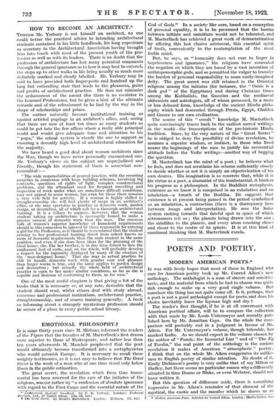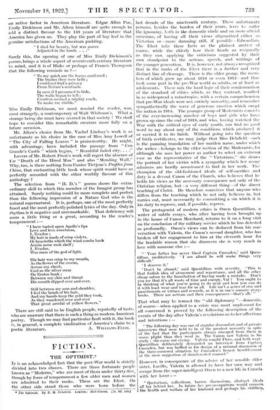POETS AND POETRY.
MODERN AMERICAN POETS.* IT was with lively hopes that most of those in England who care for American poetry took up Mr. Conrad Aiken's new anthology. The anthologist is a man of sincere and sensitive taste, and the material from which he had to choose was quite rich enough to make up a very good single volume. But somehow the thing has not quite come off. Is it, perhaps, that a poet is not a good anthologist except for poets, and does his choice inevitably leave the layman high and dry ?
The reader's first thought, if he is at all conversant with American poetical affairs, will be to compare the collection with that made by Mr. Louis Untermeyer and recently pub- lished here by Mr. Jonathan Cape. On the whole the com- parison will probably end in a judgment in favour of Mr. Aiken. For Mr. Untermeyer's volume, though tolerable, has marked faults. As we should expect in the volume chosen by the author of " Punch: the Immortal Liar " and of " The Jig of Forslin," the real point of the anthology is the curious revelation it makes of American " atmospheric " poetry. I think that on the whole Mr. Aiken exaggerates its unlike- ness to English poetry of similar intention. No doubt of it, Emily Dickinson's poetry is very unlike that of say Milton or Shelley, but there seems no particular reason why a differently situated in time Donne or Blake, or even Webster, should not have written it.
But this question of difference aside, there is something impressive in Mr. Aiken's reminder of that element of the mystical, the exotic and the macabre which he shows us as
• Modern American Pods. Selected by Conrad Aiken. London : Martin Seeker- 16s.!
an active factor in American literature. Edgar Allan Poe, Emily Dickinson and Mr. Aiken himself are quite enough to add a distinct flavour to the 150 years of literature that America has given us. They play the part of bay leaf in the genuine satisfactions of the American pudding.
" I died for beauty, but was scarce Adjusted in the tomb. . . ."
Surely this, the opening of one of Miss Emily Dickinson's poems, brings a whole aspect of seventeenth-century literature to mind, and it is of Blake or perhaps of Francis Thompson that the following reminds us ?- " To my quick ear the leaves conferred ; The bushes they were bells ; I could not find a privacy From Nature's sentinels.
In cave if I presumed to hide, The walls began to tell ; • Creation seemed a mighty crack, To make me visible."
Miss Emily Dickinson, we must remind the reader, was, most strangely, a contemporary of Walt Whitman's. What a strange being she must have seemed in that society ! We shall hope to consider this remarkable creature more fully on a future occasion.
Mr. Aiken's choice from Mr. Vachel Lindsay's work is as unfortunate as his choice in the case of Miss Amy Lowell of " The City of Falling Leaves " is praiseworthy. He might, with advantage, have included the passage from " Can Grande's Castle " which begins, " Beautiful faded city. . . ."
Lovers of Mr. Robert Frost's work will regret the absence of Vie "Death of the Hired Man" and also "Mending Wall." Why, too, is there nothing from Eunice Tietjens's Profiles from China, that enchanting little book whose spirit would have so perfectly accorded with the other worldly flavour of this anthology ?
The selection from " H. D.'s " poems shows the extra- ordinary skill to which this member of the Imagist group has attained. Surely nothing could be more complete and perfect than the following impression of a Nature God who is the natural supernatural. It is, perhaps, one of the most perfectly fused and the most perfectly polished lyrics of the day. Only in rhythm is it negative and unremarkable. That deficiency will seem a little thing or a great, according to the reader's temperament :— " I have tasted upon Apollo's lips
Love and love sweetness,
I, Evadne ; My hair is made of crisp violets, Or hyacinths which the wind combs back Across some rock shelf ;
I, Evadne,
'Was mate of the god of light.
His hair was crisp to my mouth, As the flower of the crocus, Across my cheek, Cool as the silver cress On Erotos bank ; Between my chin and throat His mouth slipped over and over.
Still between my arm and shoulder,
I feel the brush of his hair,
And may hands keep the gold they took, As they wandered over and over That great armful of yellow flowers."
There are still said to be English people, reputedly of taste, who are unaware that there is such a thing as modern American poetry. Though we may find particular fault with it, the book is, in general, a complete vindication of America's claim to a







































 Previous page
Previous page